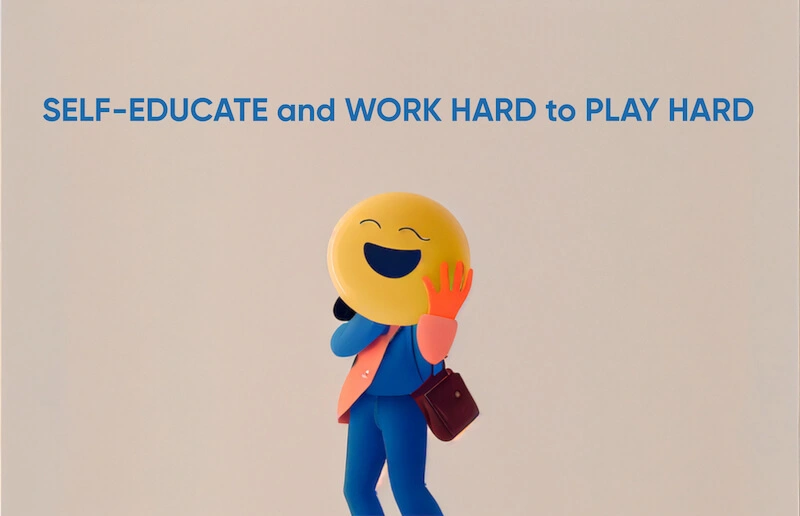
How to Improve Short-Term Memory?
Table of Contents
Short-term memory refers to the proficiency to hold onto a limited amount of information for a brief span of time. Enhancing your short-term memory can be fun and rewarding by combining various approaches such as memory exercises, using mnemonic devices, staying mentally and physically energized, maintaining a healthy diet, and understanding the factors contributing to its refinement.
How to improve short-term memory and is there really a lot of short-term memory available to improve?
Before proceeding with training to improve one’s short-term memory, it is necessary to figure out what short-term memory is – and as a ‘trainee’ – it’s beneficial to envision already what it would be like if you were already a memory master. As an experienced memory master, you already understand the significance of short-term memory in your line of work.
One should understand that it is the ability to hold and recall new information for a short period of time and that it plays a vital role in mental agility and cognitive performance. However, even the most adept memory master can benefit from regular exercise and the undertaking of new techniques to further improve their short-term memory.
One effective method to enhance short-term memory is by using mnemonic devices, such as the Mind Palace technique. This method involves attaching new data to already existing objects or locations in your mind, making it easier to identify later on. Another strategy is practicing memory exercises that challenge the brain to retain and recall information, such as remembering a list of words or numbers.
Incorporating Lifestyle Changes
Staying mentally and physically active, maintaining a healthy diet that includes memory-boosting foods such as fatty fish, coffee, blueberries, turmeric, pumpkin seeds, and dark chocolate, and understanding the factors that contribute to the improvement of short-term memory can also be beneficial. Moreover, some apps are available that can help to improve memory; thus, you can use them to enhance your short-term memory. In short, as a memory specialist, you already possess a high level of skill in short-term memory recall, but by incorporating new techniques and engaging in regular practice, you can continue to improve and perfect your abilities even more, regardless of what the societal norms are. The goal is to make having any and all memorization skills the new norm, like reading and writing.
From this, one can conclude that in order to reach the expected attainments of flexibly using short-term memory skills in everyday, it is necessary to practice just as a memory champion would. The main key to attaining great short-term memory is practicing one of the skills that can easily improve short-term memory.
Theory of short-term memory
Some people say there is a limit to how much information the short-term memory can hold at one time, known as the ‘magical number seven plus or minus two’ theory, which suggests that the average person can hold around 7 pieces of information in their short-term memory at a time. However, this number can vary depending on the individual and the type of information being held. And in general, it was shared in information to give an example of how these tendencies are perceived. This is not limited, though, and only a relatively above average to push from.
So, while there is a limit to the quantity of information that can be held in short-term memory at one period, there are ways to improve the capacity and efficiency of short-term memory, similar to how other life skills can be improved. With the right techniques and practices, it is likely to increase the quantity of information that can be held in short-term memory and retrieve it more effectively.
With the help of memory-enhancing apps, a proper diet, and an awareness of how to nurture and improve your short-term memory, you can enhance your cognitive mastery and achieve better recall. Being in nature to lose a sense of everyday mundane life to ease the mental strain and regain your web of memories, even for a brief period of time.

How to Improve Short-Term Memory?
What is short-term memory?
Short-term memory directs to the ability to retain and recall information for a concise period of time, usually a few minutes. This sort of memory is essential for understanding oral and written pedagogy and remembering small numbers. It recreates a vital role in the daily functioning of an individual.
Short-term memory is required for understanding oral and written instructions because it allows an individual to hold temporarily and process information while you’re trying to make sense of it. When you’re listening to someone speak or reading written instructions, your short-term memory is working to hold on to the information they’re offering so that you can understand it and respond appropriately. Without short-term memory, you would be unable to hold onto new knowledge long enough to process it and make decisions based on it.
For example, if somebody gives you verbal teachings for a task, you need to be able to hold onto those instructions in your short-term memory so that you can follow them accurately. Similarly, if you’re reading a set of written instructions, you need to be able to hold onto the information in your short-term memory so that you can comprehend them and complete the task. In addition, short-term memory is also important for problem-solving, decision-making, and other cognitive processes. It allows you to compare and contrast new information with what you already know and make decisions based on that information. It also permits you to store the new information in your long-term memory, so you can recall and retrieve it later. In summary, short-term memory is necessary for understanding oral and written instructions because it allows you to temporarily hold and process new information and make sense of it so that you can act upon it. With it, it is possible to follow directions and understand further new information, building on the old.

Short-term Memory Examples
A crucial cognitive system, short-term memory helps us to get through daily life. Usually lasting seconds to a minute, this kind of memory lets the brain momentarily store data for instant use. For example, better short-term memory is essential for tasks like remembering each digit of a phone number after just hearing it. Likewise, short-term memory gets activated when following a discussion, remembering directions recently given, or rapidly memorizing an address while traveling. It also happens when you read a line and instantly relate it to the next one to guarantee understanding and continuity.
From a scientific standpoint, short-term memory has been identified as essential for cognitive tasks like learning and thinking. Thus, it supports the variety of uses for the brain. Though it usually stays behind the scenes, it is important when multitasking, doing mental arithmetic, or recalling specifics in a discussion. It may go into a dormant condition without training or mental activities. Short-term memory storage may also become prone to overload when too much information is presented. Under such circumstances, worse memory usually results in mistakes in fact recall. Thus, it is vital to strengthen short-term memory if effective knowledge retention in daily life is desired.
Short-term Memory Issues
Problems in short-term memory could cause everyday difficulties and inconveniences. Common problems that could arise a mile a minute if the short-term ability to encode is compromised include forgetting where you put your keys or difficulty remembering a recent discussion. These mistakes may compromise effectiveness and lead to annoyance. Weak short-term memory makes it harder to follow directions or remember specifics in meetings. It might influence general performance in environments like offices or schools.
While long-term memory helps more complicated knowledge retention, the short-term mechanism is necessary for processing instantaneous data. Everyday activities like grocery shopping, name recall, or even making a meal may become unduly difficult without memory reinforcement. Simplifying daily activities depends on short-term memory. Its decline may complicate even basic chores, making it more difficult for one to operate normally. However, brain exercises and memory hacks can assist in its strengthening.
Loss of short-term memory
Loss of short-term memory leads to the fact that a person cannot perform ordinary household actions, for example, going to the store, and also ceases to perceive the text that they just read. Agree; it is quite difficult to read the novel if you do not remember the story that you read 2 pages ago.
The causes for losing memory are different: insufficient mental work, excessive intellectual workload, various diseases of the brain, and age-related changes. Solving the first 2 reasons is quite simple; you need to create the right balance between work and rest, then consciousness will work correctly. It is a little more difficult to deal with diseases and age-related changes; here you need a specialist consultation and medical treatment.
Loss of short-term memory can happen when our brain doesn’t work as well as it should. Sometimes, our brains can get tired or sick, and that makes it harder for us to remember things that just happened. Just like when you have a cold and your nose gets stuffy, your brain can also get stuffy, and that makes it harder to remember things. Sometimes it can be caused by things like not getting enough sleep, being stressed out, or even some medicine we take. But don’t worry; there are ways to help our brain work and remember things better, like getting enough sleep, eating healthy, and being less stressed. Just like how we take care of our bodies, we also have to take care of our brains.
To improve short-term memory, you need to understand what types of memory exist, as well as which ones you have less developed. Several varieties of human memory are distinguished:
Sensory memory
This type of memory is responsible for temporarily holding the information that is received through the five senses: sight, sound, touch, taste, and smell. It is the first stage of memory processing and lasts only a fraction of a second. It helps to keep the information that is too brief to be processed by the brain.
Eidetic memory
Also called the so-called photographic memory, which is referred to as the ability to recall visual images in great detail and clarity, as if the image were still present. It is a rare and poorly understood ability; it is considered a type of short-term memory because it lasts for only a few seconds or minutes before the image is forgotten. Also already a proven myth and does not exist.
Social memory
This type of memory refers to remembering information about people, events, and socially relevant situations. It includes things like remembering someone’s name, occupation, and other details about them. This type of memory is crucial for building and maintaining social relationships.
Topographic memory
This type of memory is used to recall spatial information, such as the layout of a room or the location of objects within it. It is important for navigation and problem-solving tasks. It helps to remember the location of things and how they are related to each other in space, allowing you to navigate through your environment with ease.
Each of them plays great importance in the life of every person. The better they are developed, the higher the intellect of the person and the more mental work they can perform.
Short-Term Memory: How to Improve it, or What Did You Just Say Again? Didn’t We Share on This Memory Stuff Already?
From another end, it is essential to understand that various factors can affect short-term memory, including specific health conditions. Therefore, before beginning any training or exercises to improve short-term memory, it is essential to properly evaluate your current memory capacity. This can be done through memory assessments or cognitive tests, which can help identify any potential underlying health issues affecting your memory.
Some examples of health issues that can lead to short-term memory loss include:
- Sleep disorders
- Neurological conditions such as Alzheimer’s disease or stroke
- Trauma to the head
- Nutritional deficiencies
- Chronic stress
- Depression and anxiety
- Hormonal imbalances
- Medications that have memory loss as a side effect
It is essential to address any underlying health issues before starting any memory improvement training. Your healthcare provider can help you to determine if any underlying conditions need to be addressed and how to address them. Some common short-term memory loss symptoms include forgetting recent events, difficulty retaining new information, and difficulty remembering names and phone numbers.

Ways to Improve Short-Term Memory in as Short as 30 Minutes
Studies show that there are many ways to improve short-term memory. Most psychology courses are advised to perform such simple workouts:
Do exercises with pictures: One way to improve short-term memory is to do activities that involve memorizing pictures. For example, you can try to memorize a complex image, such as a map or a diagram, and then try to reproduce it from memory. You can also memorize a set of pictures and then try to recall them in a different order. This helps to exercise your visual memory and improve your ability to remember details.
Try to memorize various information: Another way to improve short-term memory is to practice memorizing different types of information. This can include memorizing the phone numbers of loved ones, license plates of cars, or even random lists of words or numbers. The more you practice memorizing different types of information, the better your short-term memory will become.
Visit different beautiful places and then try to reproduce them via memory: Traveling to different places and taking in the sights, sounds, and smells can be a great way to improve your memory. When you visit a new place, take the time to take in your surroundings and memorize as many details as possible. Later on, try to recall as much as you can about the place. This can help improve your spatial memory and ability to remember details about a particular location.
Do memory games and puzzles: There are many memory games and puzzles available online, such as memory matching games, crosswords, and Sudoku; these activities can help to improve your short-term memory by making you remember and recall information quickly.
Get good sleep: Adequate sleep is essential for good memory. In addition, studies have shown that sleep is vital for memory consolidation, the process of transferring information from short-term to long-term memory.
Try meditation or yoga: Both meditation and yoga have been shown to improve memory and cognitive function. In addition, these practices can help to reduce stress and improve focus, which can lead to better memory.
Stay active: Regular physical activity has been shown to improve overall brain function, including memory.
Eat a healthy diet: Eating a diet rich in fruits, vegetables, and omega-3 fatty acids can help improve memory and cognitive function.
Learn a new skill or language: Learning a new skill or language can help to improve memory and cognitive function.
Avoid multitasking: Multitasking can lead to cognitive overload, making it harder to remember information. Instead, focus on one task at a time to improve your memory.
In addition, today, several suitable applications have been developed. Fortunately, they offer to improve short-term memory. As a rule, they have a reasonably simple interface, and learning occurs in a game form. You can engage in such a system for a few minutes a day in your free time. It is always fun and exciting.
Specific Nutrition to Improve Short Term Memory
Ways to improve short-term memory include changes in nutrition. It has been scientifically proven that products containing a lot of omega-3, sulfur, and phosphorus have a favorable effect on the brain and memory. Among such products, the most useful are:
- Fatty fish such as redfish are a good source of omega-3 fatty acids, which have been shown to be beneficial for brain health and cognitive function.
- Coffee contains caffeine, which can improve alertness, focus, and concentration, which are all important for short-term memory.
- Blueberries are known to be a “brain-boosting” food; they contain antioxidants that protect the brain from damage and can improve cognitive function.
- Turmeric is a spice that contains curcumin, which has been shown to have anti-inflammatory effects and may improve memory and cognitive function.
- Pumpkin seeds are a good source of zinc, which has been shown to be important for memory and cognitive function.
- Dark chocolate contains flavonoids that are good for the brain; they have been found to improve cognitive function and may help protect the brain from damage.
It’s important to note that these foods may help improve short-term memory when consumed in moderate amounts as part of a balanced diet, but eating large amounts of them is not recommended. It’s best to always consult a healthcare professional before making changes to your diet.
It is not necessary to abuse these products, but their regular use will help make the ability to memorize much better. In addition, loss of short-term memory can be cured with proper training and dedication. Indeed this is the best-case scenario and rightful aspiration.

Mind Palaces to Improve Short-Term Memory
Use Mind Palaces to Improve Short-Term Memory
The Mind Palace, also known as the Memory Palace, is a mnemonic technique that uses visualization and association to help improve memory. The idea is to attach new information to pre-existing images or concepts stored in your long-term memory, creating a mental map or “palace” of information. This technique can be especially useful for improving short-term memory because it allows for storing and retrieving information quickly and easily. By attaching new information to familiar images, the brain creates a more meaningful and memorable connection, making it more likely to be retained in short-term memory. Additionally, visualizing and walking through the mental palace helps to activate different parts of the brain, making it more likely to remember the information. This technique also allows organizing information in a way that makes sense to you, making it easier to recall later on.
In general, what are the best ways how to improve memory, one might ask? Unfortunately or fortunately, practice shows that it is pretty challenging to find a universal answer because each person’s consciousness works differently. Nevertheless, the simple tips above will help to slightly improve the overall state of memory and the work of consciousness in general.
FAQ
What are some ways to improve short-term memory?
Some ways to improve short-term memory include practicing active recall, chunking information, using mnemonics, repeating information, using visualization, staying organized, getting enough sleep, exercising regularly, practicing mindfulness, and limiting multitasking.
How can I improve my visual memory?
To improve your visual memory, you can do exercises that involve memorizing pictures or diagrams. You can also practice different learning types of information, such as license plates or street signs. Additionally, visiting beautiful places and trying to reproduce them via memory can help improve your visual memory.
Is there any relationship between sleep and short-term memory?
Yes, there is a relationship between sleep and short-term memory. Sleep is important for memory consolidation, the process of transferring information from short-term to long-term memory. Although adequate sleep is essential for good memory, studies have shown that people who need more sleep tend to have more difficulty remembering new information.